bhofack2/iStock/GettyImages
Eggs can be baked, scrambled, poached, fried or hard-boiled, and given all these variations, the question of long they can be safely stored is a good one to consider. A bacteria called Salmonella enteritidis can be present inside the yolk, but hard-boiling eggs makes them safe to eat. How these eggs are handled, and the temperature and place where they are stored in the refrigerator, are all contributing factors that affect the storage life of a hard-cooked egg.
Where to Store Eggs
Even before the eggs are cooked, proper storage will help your eggs have a longer shelf life. According to the U.S. Department of Agriculture, eggs should be stored in the back of the refrigerator, where it is coldest, and not in the egg cups on the side of the refrigerator door. Hard-boiled eggs kept inside the egg carton or in a container at the back of the refrigerator will stay fresh for up to one week.
Why You Shouldn’t Wash the Eggs
There is a protective coat of mineral oil put on the outside shell of eggs. Washing eggs can remove this coating and increase the chances of bacteria entering the egg. When eggs are hard-boiled, this protective coating is completely removed, which is why hard-boiled eggs only last for one week, while raw eggs can be good for up to five weeks if kept unwashed in their shells and in a refrigerator at or slightly below 40 degrees Fahrenheit.
How to Handle Easter Eggs
You might wonder whether the hard-boiled eggs decorated and hidden for Easter egg hunts are good to eat after they have been found. The University of Arizona Cooperative Extension says Easter eggs are safe to eat as long as they are not kept out of the refrigerator for more than two hours. After two hours, the eggs start to dry out and become more likely to host bacteria or mold growth. Once present, bacteria inside the shell can multiply at a rapid rate. Throw out any hard-boiled eggs you find several hours or days after the egg hunt is over.
Peeling Tip for Hard-Boiled Eggs
Ironically, the older the egg is, the easier to peel once it has been hard-boiled. For easy peeling, plunge them in a cold water bath right after boiling. This also helps cool them down for peeling. Hard-boiled eggs that have been cooled in a water bath are even easier to peel after they have been stored in refrigerator, because the inside of the egg starts to separate from the shell when cold.
Storage for Other Cooked Eggs
Eggs that have been cooked outside of the shell -- such as scrambled or fried -- don’t keep as long as hard-boiled eggs. To maximize their storage life, cool the cooked eggs quickly by placing in shallow containers, and refrigerate within two hours. They will keep for three to four days at most. When you separate egg yolks from whites to use in baking, you can safely keep the remaining and unused part of the egg in a sealed container for up to four days.
Related Articles
How Long Before a Hard Boiled Egg Goes ...
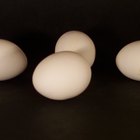
How to Boil Organic Eggs
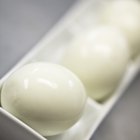
How to Make Salted Egg

Can You Eat a Broken Egg?
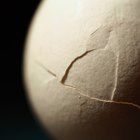
Can You Hard Boil a Broken Egg?
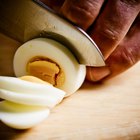
Can You Eat Hard-Boiled Eggs Even ...
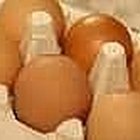
How to Make Your Deviled Eggs Look Great
How Much Does it Cost to Freeze Your ...
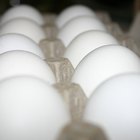
How to Store Cracked Eggs in ...
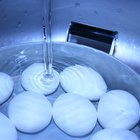
How to Overcook Hard Boiled Eggs

Can You Still Cook Eggs If They Are a ...
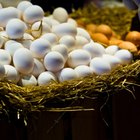
How to Cook a Hard Boiled Egg With a ...

How Long Will Eggs Last if Covered in ...
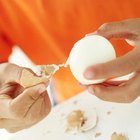
Should I Pierce Eggs Before Boiling?

Shelf Life of Hard Boiled Eggs
How to Keep Yolks in the Center of Hard ...

Can You Eat an Egg That's Been Frozen?

What Causes an Eggshell to Stick to a ...

How to Prevent Dark Circles in Hard ...

My Hard-Boiled Eggs Are Soggy in the ...
References
Resources
Writer Bio
For more than 10 years, Carol Butler has run a small, off-grid furniture business with her husband and is a regular contributor to the Edible community of magazines. As staff writer for RichLife Advisors, she covers financial planning and other industry-related topics. She holds a B.F.A. in theater arts.